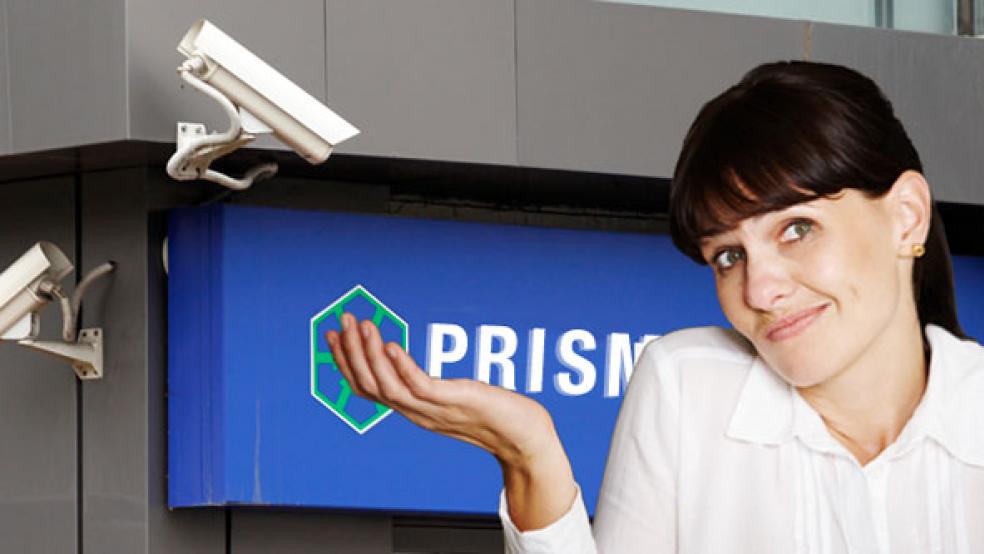The controversy over the government’s surveillance of personal communications reached a fever pitch last week, with each day bringing new evidence of secret programs that invade all parts of American life.

On top of the news that the Justice Department had subpoenaed phone records of the press, reports last week showed that the National Security Agency was tracking the length and numbers of incoming and outgoing international calls. The NSA is also coordinating with technology companies to track Internet activities of U.S. citizens in a program known as PRISM. Great Britain is also working with the NSA to monitor Americans.
RELATED: U.S. Agents Are Stalking Us on the Internet
The outrage of the programs was immediate.
“The secrecy surrounding the government’s extraordinary surveillance powers has stymied our system of checks and balances,” said Laura Murphy, director of the American Civil Liberties Union’s Washington Legislative Office. “Congress must initiate an investigation to fully uncover the scope of these powers and their constraints, and it must enact reforms that protect Americans’ right to privacy and that enable effective public oversight of our government.”
It turns out Congress does know, and has known for years, about the vast surveillance network. Sen. Diane Feinstein (D-CA), chairman of the Senate Intelligence Committee, said Congress was aware of the programs and that they were legal. “It’s called protecting America,” she said of the programs.
Even prominent House Republicans defense the programs. House Intelligence Committee Chairman Mike Rogers (R-MI) said the NSA surveillance program had proven itself effective. “Within the last few years, this program was used to stop a terrorist attack in the United States. We know that. It’s important. It fills in a little seam that we have,” he said. “And it’s used to make sure that there is not an international nexus to any terrorism event if there may be one ongoing. So in that regard, it is a very valuable thing.”
By Friday afternoon, President Obama was forced to reassure the public that the government was not overstepping its bounds. “No one is listening to your phone calls,” Obama said Friday afternoon. The surveillance programs are conducted “under very strict supervision by all three branches of government and they do not involve listening to people’s phone calls, do not involve reading the e-mails of U.S. citizens and U.S. residents.”
Despite last week’s dramatic headlines about the programs, none of them are new. The United States and its citizens have been under constant surveillance since 2001. Former President George W. Bush created the programs and Obama simply continued implementing them.
In October 2001, a month after the 9/11 attacks, Congress passed the Patriot Act, giving the government sweeping surveillance authority, including the ability to wiretap without warrants. Later that year, NSA began mining Internet data without a warrant.
In 2005, the government admitted to warrantless eavesdropping of calls that involved people suspected to have ties with al Qaeda. In 2007, the majority of the surveillance practices used by Bush were brought under the Foreign Intelligence Surveillance Act, making them legal under U.S. law. Late that year, Bush amended the law to formally allow warrantless wiretapping.
As president, Obama did nothing to limit these activities. On the contrary, he expanded them. He extended parts of the law to include information related to business travel. The PRISM and phone surveillance programs are just extensions of previous programs. (The New York Times has a helpful timeline outlining the evolution of the surveillance state.)
“We scrubbed them thoroughly,” Obama said of the surveillance programs he inherited. “We actually expanded some of the oversight, increased some of the safeguards. But my assessment and my team’s assessment was that they help us prevent terrorist attacks. And the modest encroachments on privacy that are involved in getting phone numbers or duration [of calls] without a name attached and not looking at content, that on net it was worth us doing.”
DISAPPOINTMENT FROM CIVIL LIBERTARIANS
The controversy over the surveillance issue has not gained traction with the general public. After the Boston marathon attacks, a New York Times/CBS News Poll found that 78 percent of people wanted more surveillance cameras. Monitoring individual communications is a different issue, but there was little public opposition to the practice during the Bush years.
The majority of his critics are on the left, who were under the mistaken belief Obama would abandon all of the surveillance practices of the Bush administration. Instead, Obama has doubled down on the programs, winning praise from even his most vociferous critics.
When asked about Sen. Rand Paul’s (R-KY) assertion that the program was an assault on the Constitution, Sen. Lindsey Graham (R-SC) said, “Sen. Rand Paul, he’s a libertarian, and in Rand Paul’s world you have almost no defenses against terrorists…In Rand Paul’s world, you can’t hold somebody for questioning who’s been involved in an attack on our country.”
For good measure, Graham added, “I see the threat to the average American, radical Islam coming to our backyard trying to destroy our way of life. He sees the threat (from) the government that's trying to stop the attack. I'm more threatened by the radical Islamists than I am the government agencies who are trying to protect us.”





